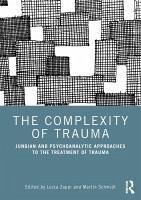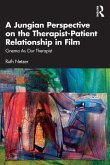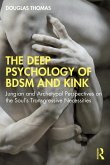Dedicated to Daniela Eulert-Fuchs, this important volume offers a broad and in-depth overview of how to understand and treat trauma from a Jungian perspective, written by internationally recognized experts in the field of Jungian and traditional psychoanalysis.
It applies C.G. Jung's concept of the 'complex' and his understanding of splitting processes of the psyche to trauma. Traversing a range of pertinent themes including archetypal defences, primary narcissistic wounding, somatic symptoms, symbolic representation and processing, transference and types of memory, the book features a variety of voices from different theoretical perspectives, with each contributor offering clinical examples and lessons from their experiences working with patients. Chapters cover a wide range of clinical phenomena including early relational trauma, dissociative states, the Self-care System, unconscious communication, embodied countertransference, eroticization, PTSD, creativity and cultural/social issues.
The Complexity of Trauma is key reading for psychoanalysts and therapists as well as for researchers, students, and trainees in schools of psychodynamic psychotherapy and those interested in working with trauma.
It applies C.G. Jung's concept of the 'complex' and his understanding of splitting processes of the psyche to trauma. Traversing a range of pertinent themes including archetypal defences, primary narcissistic wounding, somatic symptoms, symbolic representation and processing, transference and types of memory, the book features a variety of voices from different theoretical perspectives, with each contributor offering clinical examples and lessons from their experiences working with patients. Chapters cover a wide range of clinical phenomena including early relational trauma, dissociative states, the Self-care System, unconscious communication, embodied countertransference, eroticization, PTSD, creativity and cultural/social issues.
The Complexity of Trauma is key reading for psychoanalysts and therapists as well as for researchers, students, and trainees in schools of psychodynamic psychotherapy and those interested in working with trauma.
'Zoppi and Schmidt, themselves Jungian analysts of international reputation on the subject of trauma, have assembled a set of papers crammed with the insights and expertise of a group of esteemed authors. Originally formulated as a lecture series, the book offers sharp focus on experiences of analyst and patient in consulting room encounters. The reader will find exploration of unconscious unmetabolized states of early overwhelm that may be somatically, behaviourally or inter-subjectively expressed. Fresh post-Jungian perspectives are teamed with clinical acumen. I can recommend it to anyone working in a clinical context or seeking to immerse themselves in a diversity of academic and clinical reflections on this topic, which is of fundamental importance in understanding psychic gridlock and psychic development.'
Susanna Wright, former co-editor in chief of the Journal of Analytical Psychology, training and supervising analyst for SAP and BJAA and a member of the IAAP Executive Committee.
'Trauma and PTSD are the dominating ailments of our age which plague the victim and torment the analyst. Finally, we have a volume, based on a unique, international dialogue between Italian, British, Austrian, Colombian, Chinese, Latvian, Russian, Serbian and American analysts that firmly embraces The Complexity of Trauma in depth. The collection brings together well known shamans of trauma, like Donald Kalsched, as well as lesser known but vibrant voices from the Jungian world. The interconnection between high level theory, from across the full psychoanalytic spectrum, with engaging clinical cases is especially rewarding. This volume is one you will want to read again and again.'
Henry Abramovitch, Founding President, Israel Institute of Jungian Psychology in honour of Erich Neumann, Professor Emeritus, Tel Aviv University Medical School.
'The Complexity of Trauma, co-edited by Luisa Zoppi and Martin Schmidt, contains a collection of highly informative, thought-provoking and wide-ranging articles on trauma; a topic that sadly, for many tragic reasons, has become more and more relevant for us Jungian analysts in today's world. The chapters in the book cover a wide range of perspectives, which together contribute to a highly valuable analytical psychological understanding of trauma. The combination of poignant clinical studies and unique, innovative theoretical contributions makes this book an indispensable addition to the libraries of training institutes and of Jungian analysts, psychoanalysts and other professionals in the psychological field.'
Misser Berg, Jungian analyst, President of the IAAP, former President of DSAP and former Director of Training at the Jung Institute in Copenhagen.
'Arising from a response to the traumas induced by the COVID-19 pandemic, this remarkable collection of essays by a broad range of international experts in analytical psychology is a true gift to therapeutic communities around the world. A 21st century understanding of complexes, their role in trauma and subsequent healing will advance the field on multiple fronts. Chapters explore a wide range of topics from psychodynamics including mythic and symbolic understanding, to the history of the field, and on to contributions from the neurosciences, and socio-cultural phenomena associated with the study of trauma and subsequent recovery. These are all integrated within a Jungian-based model which makes The Complexity of Trauma a rare and insightful volume. Editors and authors Luisa Zoppi and Martin Schmidt have done us all a great service in their thoughtful choices and excellent presentation assembled in this volume.'
Joe Cambray, Ph.D., IAAP, Past-president/CEO, Pacifica Graduate Institute.
'The book The Complexity of Trauma is born, as the two Editors write in their Introduction, from significant and multiple exchanges among expert Jungian psychoanalysts working in different parts of the world, who contributed to a course of higher education promoted by the Italian Association for Analytical Psychology (AIPA). This course, coordinated by Luisa Zoppi (Rome) in 2021, was a fruitful occasion for many international colleagues to meet and discuss theoretical and clinical approaches to the theme of trauma and post-traumatic developments from the latest perspectives of Analytical Psychology. This book, collecting together innovative insights and deep reflections which arose from those exchanges, presents itself as an updated review of the many theoretical issues which help clinicians to understand symptoms and states of mind derived from developmental trauma in different conditions and at different ages and how to treat them. Furthermore, clinical strategies and techniques are discussed, which are relevant in analytical assessment and psychotherapy of traumatized patients in childhood, adolescence and adulthood. For instance, special consideration is devoted to new therapeutic techniques, that analysts can introduce in their work, aiming at treating very early relational traumas, which are neither remembered nor symbolically representable.'
Alessandra De Coro, Former professor at 'Sapienza' University Rome, training analyst and former President of AIPA, IAAP EC member from 2010 to 2016, and Liaison Person for Kazakhstan.
'The editors of this collection of outstanding articles, Luisa Zoppi and Martin Schmidt, have managed to gather an exquisite array of perspectives on the ubiquitous and challenging topic of working with trauma. This book offers the reader a clinical smorgasbord, from a Jungian perspective, on a topic that lies at the very heart of analytic and psychotherapeutic work, regardless of one's clinical orientation. Donald Kalsched's article on early relational trauma and his understanding of the Self-care System sets the stage for links to the earlier contributions of such eminent authors as Fordham, Winnicott and Bion on this very topic. Daniela Eulert-Fuchs' article on her clinical work with a young boy provides the reader with a vivid and penetrating example of the clinical maze of navigating one's way through the impervious intensity of the constellated counter transferential affects in order to get a clearer grasp and understanding of root causes of the trauma. The spectrum of the remaining articles includes the exploration of the topic of trauma from a neurobiological perspective, dissociation and the link to trans-generational trauma, cultural trauma and work with migrants, and the role of memory and creativity in healing trauma. This book is unique in its broad perspective and an absolute must for clinicians seriously interested in delving into and deepening their understanding of the complexity of the wounds underlying trauma. I highly recommend this book and consider it a must for clinicians.'
Tom Kelly, Past President of IAAP (2013 - 2016), current Chair of the Ethics Committee of IAAP, in clinical practice in Montreal, Canada.
'This book emerged from an online course on trauma and complexes. Masterly edited by Luisa Zoppi and Martin Schmidt, it fascinates in its range of topics. Earlier work by Michael Fordham, Fairbairn and Bion are covered as well as Donald Kalsched's original ideas. It includes topics such as early relational trauma, dissociative processes, transgenerational trauma, social trauma, neurobiological findings and creative methods of healing. This is an eminently clinical book with the emphasis on transference and countertransference in the clinical encounter, unconscious communication and not avoiding sexualised transference, hatred and violence. Contributors share the richness of their experience and give moving insights into their work, including social and cultural aspects. The last section is dedicated to creative methods of healing. Professor Heyong Shen offers a poetic Oriental approach and introduces the reader to the Chinese 'Psychology of the Heart'. This book is a treasure trove!'
Arthur Niesser, Medical doctor and Jungian analyst, Member of AJA (London) and the C.G. Jung Institut Stuttgart (Germany), current co-editor of the Journal of Analytical Psychology
'This book is so timely given that we are all living through such a difficult time of collective and personal trauma with war and destructiveness all around us. It should be read. In their book, Zoppi and Schmidt have gathered together a group of international authors expert in different aspects of trauma ranging from the impact of early relational trauma to the cultural aspects of trauma evident in different parts of the world. The book offers readers a contemporary Jungian approach that acknowledges the fractured complexes observable in patients suffering from trauma, the different types of dissociation that can develop and more generally an understanding of the kinds of defences we are likely to encounter with our patients. This is a volume that will be valuable to therapists, analysts and those in training for many years to come.'
Jan Wiener, Jungian Supervising Analyst, former Vice-President of the IAAP, Society of Analytical Psychology, London.
'In The Complexity of Trauma, the editors, Luisa Zoppi and Martin Schmidt, have gathered and curated a wonderful selection of papers on trauma written by eminent scholars and clinicians (including Donald Kalsched) from the field of Analytical Psychology. The breadth and depth of the papers is inspiring - providing a contemporary exploration of trauma (individual, collective, cultural and transgenerational) and the treatment of trauma from a Jungian perspective. The close relationship between trauma and complex theory is examined by several of the authors. Points of intersection between trauma and dissociation, somatic experience, eroticized transference, affect, neuroscience and creativity are also explored. This volume is an essential read for practicing Jungian clinicians and students of Analytical Psychology. Highly recommended.'
Mark Winborn, PhD, Jungian psychoanalyst, clinical psychologist, author of Interpretation in Jungian Analysis: Art and Technique and Jungian Psychoanalysis: A Contemporary Introduction.
Susanna Wright, former co-editor in chief of the Journal of Analytical Psychology, training and supervising analyst for SAP and BJAA and a member of the IAAP Executive Committee.
'Trauma and PTSD are the dominating ailments of our age which plague the victim and torment the analyst. Finally, we have a volume, based on a unique, international dialogue between Italian, British, Austrian, Colombian, Chinese, Latvian, Russian, Serbian and American analysts that firmly embraces The Complexity of Trauma in depth. The collection brings together well known shamans of trauma, like Donald Kalsched, as well as lesser known but vibrant voices from the Jungian world. The interconnection between high level theory, from across the full psychoanalytic spectrum, with engaging clinical cases is especially rewarding. This volume is one you will want to read again and again.'
Henry Abramovitch, Founding President, Israel Institute of Jungian Psychology in honour of Erich Neumann, Professor Emeritus, Tel Aviv University Medical School.
'The Complexity of Trauma, co-edited by Luisa Zoppi and Martin Schmidt, contains a collection of highly informative, thought-provoking and wide-ranging articles on trauma; a topic that sadly, for many tragic reasons, has become more and more relevant for us Jungian analysts in today's world. The chapters in the book cover a wide range of perspectives, which together contribute to a highly valuable analytical psychological understanding of trauma. The combination of poignant clinical studies and unique, innovative theoretical contributions makes this book an indispensable addition to the libraries of training institutes and of Jungian analysts, psychoanalysts and other professionals in the psychological field.'
Misser Berg, Jungian analyst, President of the IAAP, former President of DSAP and former Director of Training at the Jung Institute in Copenhagen.
'Arising from a response to the traumas induced by the COVID-19 pandemic, this remarkable collection of essays by a broad range of international experts in analytical psychology is a true gift to therapeutic communities around the world. A 21st century understanding of complexes, their role in trauma and subsequent healing will advance the field on multiple fronts. Chapters explore a wide range of topics from psychodynamics including mythic and symbolic understanding, to the history of the field, and on to contributions from the neurosciences, and socio-cultural phenomena associated with the study of trauma and subsequent recovery. These are all integrated within a Jungian-based model which makes The Complexity of Trauma a rare and insightful volume. Editors and authors Luisa Zoppi and Martin Schmidt have done us all a great service in their thoughtful choices and excellent presentation assembled in this volume.'
Joe Cambray, Ph.D., IAAP, Past-president/CEO, Pacifica Graduate Institute.
'The book The Complexity of Trauma is born, as the two Editors write in their Introduction, from significant and multiple exchanges among expert Jungian psychoanalysts working in different parts of the world, who contributed to a course of higher education promoted by the Italian Association for Analytical Psychology (AIPA). This course, coordinated by Luisa Zoppi (Rome) in 2021, was a fruitful occasion for many international colleagues to meet and discuss theoretical and clinical approaches to the theme of trauma and post-traumatic developments from the latest perspectives of Analytical Psychology. This book, collecting together innovative insights and deep reflections which arose from those exchanges, presents itself as an updated review of the many theoretical issues which help clinicians to understand symptoms and states of mind derived from developmental trauma in different conditions and at different ages and how to treat them. Furthermore, clinical strategies and techniques are discussed, which are relevant in analytical assessment and psychotherapy of traumatized patients in childhood, adolescence and adulthood. For instance, special consideration is devoted to new therapeutic techniques, that analysts can introduce in their work, aiming at treating very early relational traumas, which are neither remembered nor symbolically representable.'
Alessandra De Coro, Former professor at 'Sapienza' University Rome, training analyst and former President of AIPA, IAAP EC member from 2010 to 2016, and Liaison Person for Kazakhstan.
'The editors of this collection of outstanding articles, Luisa Zoppi and Martin Schmidt, have managed to gather an exquisite array of perspectives on the ubiquitous and challenging topic of working with trauma. This book offers the reader a clinical smorgasbord, from a Jungian perspective, on a topic that lies at the very heart of analytic and psychotherapeutic work, regardless of one's clinical orientation. Donald Kalsched's article on early relational trauma and his understanding of the Self-care System sets the stage for links to the earlier contributions of such eminent authors as Fordham, Winnicott and Bion on this very topic. Daniela Eulert-Fuchs' article on her clinical work with a young boy provides the reader with a vivid and penetrating example of the clinical maze of navigating one's way through the impervious intensity of the constellated counter transferential affects in order to get a clearer grasp and understanding of root causes of the trauma. The spectrum of the remaining articles includes the exploration of the topic of trauma from a neurobiological perspective, dissociation and the link to trans-generational trauma, cultural trauma and work with migrants, and the role of memory and creativity in healing trauma. This book is unique in its broad perspective and an absolute must for clinicians seriously interested in delving into and deepening their understanding of the complexity of the wounds underlying trauma. I highly recommend this book and consider it a must for clinicians.'
Tom Kelly, Past President of IAAP (2013 - 2016), current Chair of the Ethics Committee of IAAP, in clinical practice in Montreal, Canada.
'This book emerged from an online course on trauma and complexes. Masterly edited by Luisa Zoppi and Martin Schmidt, it fascinates in its range of topics. Earlier work by Michael Fordham, Fairbairn and Bion are covered as well as Donald Kalsched's original ideas. It includes topics such as early relational trauma, dissociative processes, transgenerational trauma, social trauma, neurobiological findings and creative methods of healing. This is an eminently clinical book with the emphasis on transference and countertransference in the clinical encounter, unconscious communication and not avoiding sexualised transference, hatred and violence. Contributors share the richness of their experience and give moving insights into their work, including social and cultural aspects. The last section is dedicated to creative methods of healing. Professor Heyong Shen offers a poetic Oriental approach and introduces the reader to the Chinese 'Psychology of the Heart'. This book is a treasure trove!'
Arthur Niesser, Medical doctor and Jungian analyst, Member of AJA (London) and the C.G. Jung Institut Stuttgart (Germany), current co-editor of the Journal of Analytical Psychology
'This book is so timely given that we are all living through such a difficult time of collective and personal trauma with war and destructiveness all around us. It should be read. In their book, Zoppi and Schmidt have gathered together a group of international authors expert in different aspects of trauma ranging from the impact of early relational trauma to the cultural aspects of trauma evident in different parts of the world. The book offers readers a contemporary Jungian approach that acknowledges the fractured complexes observable in patients suffering from trauma, the different types of dissociation that can develop and more generally an understanding of the kinds of defences we are likely to encounter with our patients. This is a volume that will be valuable to therapists, analysts and those in training for many years to come.'
Jan Wiener, Jungian Supervising Analyst, former Vice-President of the IAAP, Society of Analytical Psychology, London.
'In The Complexity of Trauma, the editors, Luisa Zoppi and Martin Schmidt, have gathered and curated a wonderful selection of papers on trauma written by eminent scholars and clinicians (including Donald Kalsched) from the field of Analytical Psychology. The breadth and depth of the papers is inspiring - providing a contemporary exploration of trauma (individual, collective, cultural and transgenerational) and the treatment of trauma from a Jungian perspective. The close relationship between trauma and complex theory is examined by several of the authors. Points of intersection between trauma and dissociation, somatic experience, eroticized transference, affect, neuroscience and creativity are also explored. This volume is an essential read for practicing Jungian clinicians and students of Analytical Psychology. Highly recommended.'
Mark Winborn, PhD, Jungian psychoanalyst, clinical psychologist, author of Interpretation in Jungian Analysis: Art and Technique and Jungian Psychoanalysis: A Contemporary Introduction.








